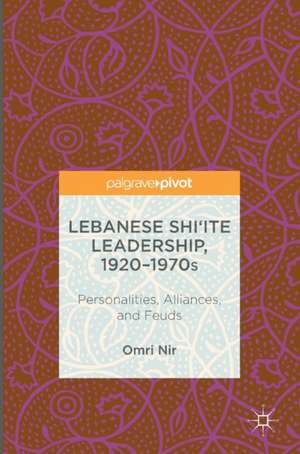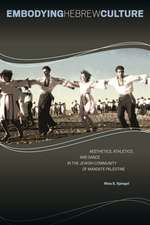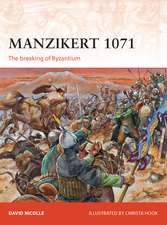Lebanese Shi‘ite Leadership, 1920–1970s: Personalities, Alliances, and Feuds
Autor Omri Niren Limba Engleză Hardback – 4 noi 2016
| Toate formatele și edițiile | Preț | Express |
|---|---|---|
| Paperback (1) | 411.16 lei 6-8 săpt. | |
| Springer International Publishing – 6 iul 2018 | 411.16 lei 6-8 săpt. | |
| Hardback (1) | 417.30 lei 6-8 săpt. | |
| Springer International Publishing – 4 noi 2016 | 417.30 lei 6-8 săpt. |
Preț: 417.30 lei
Nou
Puncte Express: 626
Preț estimativ în valută:
79.86€ • 82.74$ • 66.65£
79.86€ • 82.74$ • 66.65£
Carte tipărită la comandă
Livrare economică 21 martie-04 aprilie
Preluare comenzi: 021 569.72.76
Specificații
ISBN-13: 9783319430133
ISBN-10: 3319430130
Pagini: 159
Ilustrații: VII, 132 p. 10 illus. in color.
Dimensiuni: 148 x 210 x 10 mm
Greutate: 0.32 kg
Ediția:1st ed. 2017
Editura: Springer International Publishing
Colecția Palgrave Macmillan
Locul publicării:Cham, Switzerland
ISBN-10: 3319430130
Pagini: 159
Ilustrații: VII, 132 p. 10 illus. in color.
Dimensiuni: 148 x 210 x 10 mm
Greutate: 0.32 kg
Ediția:1st ed. 2017
Editura: Springer International Publishing
Colecția Palgrave Macmillan
Locul publicării:Cham, Switzerland
Cuprins
1. Introduction.- 2. Main Classes in the Traditional Lebanese Shi‘ite Leadership.- 3. The Centers of Power.- 4. The Speakership of the Parliament.- 5. The Intellectuals and the Power Centers.- 6. The Decline of the Zu‘ama.- 7. Conclusions: Modifications of Community Leadership.
Notă biografică
Omri Nir is a leading scholar of Lebanese history and politics and is a lecturer at the Departments of Islamic and Middle Eastern Studies at the Hebrew University of Jerusalem, Tel-Aviv University, Ben-Gurion University of the Negev, and Achva College, Israel. He is often interviewed on Lebanese issues in Israeli, international, and Arab media. He has published numerous articles and is the author of Nabih Berri and Lebanese Politics.
Textul de pe ultima copertă
This book examines the coalitions and relationships within the power centers of Shi'ite politics during the era of political feudalism in Lebanon. The author maps the Shi'ite leadership and its inter-connections, including the alliances and rivalry between prominent Zu'ama, clans, and Ulama' from the formation of Lebanon in 1920 to the decline of old Shi'ite politics and the emergence of popular movements in the 1970s. The work also explains the role of prominent intellectuals within these power centers.
Omri Nir is a leading scholar of Lebanese history and politics and is a lecturer at the Departments of Islamic and Middle Eastern Studies at the Hebrew University of Jerusalem, Tel-Aviv University, Ben-Gurion University of the Negev, and Achva College, Israel. He is often interviewed on Lebanese issues in Israeli, international, and Arab media. He has published numerous articles and is the author of Nabih Berri and Lebanese Politics.














